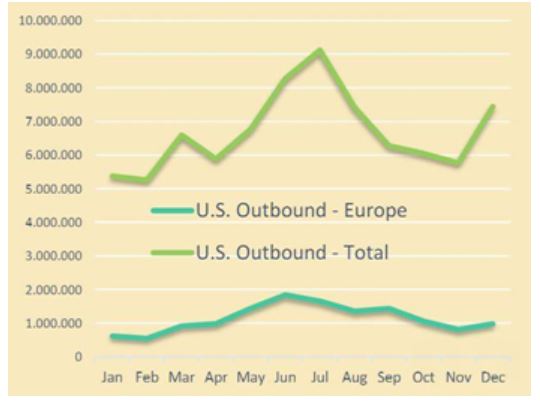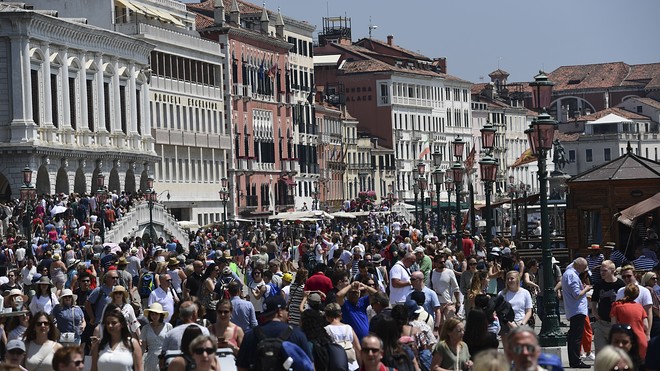As Europe’s summer wears on, with photos of sparsely populated tourist spots filling up social media, it has become painfully clear that a season — or perhaps more — without American tourists will be costly.
The European Union banned U.S. travelers on June 30, due to the uncontrolled spread of coronavirus in the country, and may extend that amid fears of a second outbreak of COVID-19. That means saying goodbye to a lot of American dollars.
According to data from the European Travel Commission, some 38 million U.S. tourists visited Europe in 2019, nearly 5% of all international arrivals, and they spend the most on tourism after China. Travel-related spending by Americans on European trips reached $52.43 billion in 2018, according to the U.S. National Travel and Tourism Office, with airfares alone reaching $17.82 billion.

“These figures suggest devastating losses, but it is very hard to make any estimations, at the moment, as nothing is really certain in the short term,” said Jennifer Iduh, head of research and development at ETC, in emailed comments.
Simon Hudson, professor at the University of South Carolina in the College of Hospitality, Retail and Sport Management, told MarketWatch that Europe will see the younger, so-called “crisis resistant” travelers return, but what matters more is the lucrative group born between 1944 and 1964.
“Your typical baby boomer, who spends a week in London, goes over to Paris, travels to Italy — it’s going to be a while before they come back, unless we find a vaccine. Safety and security is always their No. 1 priority anyway, so with this crisis, it’s going to take more to convince them it’s safe to travel,” said Hudson.

The way we were. Crowds near San Marco square in Venice, Italy, on June 8, 2019.
AFP via Getty Images
A 2019 survey by the American Association of Retired Persons found that 53% of boomers surveyed budgeted $6,000 for four to five trips in a year, with Europe at the top of the list for one or two international trips.
Hudson, who recently published “COVID-19 and Travel” said that the service industry will definitely miss generous American tippers, though a 2013 survey found Germans to be far more generous.
As European infections have dropped markedly, while U.S. infections have been surging, the Continent is starting to see a trickling of other visitors, such as from other EU countries who aren’t barred. But some countries may be missing older, refined American tourists, as they also try to reimagine a new breed of tourism that relies less on young partyers flying in on cheap tickets.
A recent poll by YouGov recently showed that people in Spain, France, Italy, and Germany were more opposed to Britons than visitors from any other European country. Viral videos of rowdy young U.K. and German visitors — not observing COVID-19 safety guidelines — on the Spanish island of Mallorca this month have irritated locals and prompted warnings of quarantines on their return.
Bob DiMenna, co-host of The Travelers Blueprint Podcast, told MarketWatch in emailed comments that Americans still itching for an international vacation can get to a few destinations.
“Travel content creators have told me that hotels, restaurants, and people within the tourism industry are giving away free stays and meals to entice these travel influencers to come to Greece and post pictures of themselves enjoying their time there in hopes to bring tourists back,” DiMenna said.
He said he has heard unconfirmed reports of several Caribbean nations that will “try their best to bring tourism back to their countries to ease the huge economic loss they suffered so far this summer.” Indeed, the Barbados government is considering a plan to allow Americans and other foreigners the chance to relocate to the Caribbean island and work remotely for up to 12 months.
But for Europe, a long, empty summer trudges on.










Add Comment